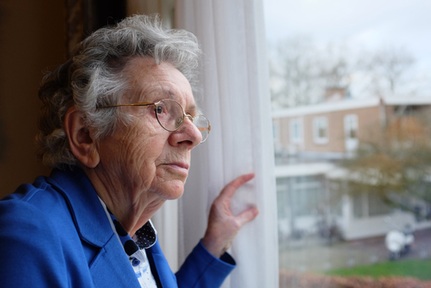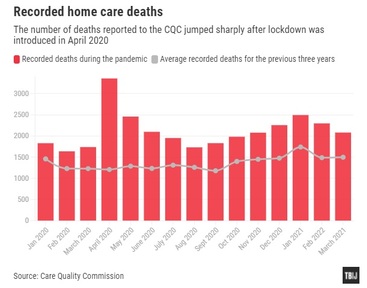Over 25,000 people needing home care in England died in pandemic of mostly non-Covid conditions
More than 25,000 people reliant on home care died during the pandemic in England and almost 3,000 died in Scotland but the majority of deaths were not Covid-related, new research reveals.

The number of deaths of people needing home care that was reported to England’s Care Quality Commission (CQC) and the Scottish Care Inspectorate between April 2020 - March 2021 rose by 49 per cent in England and 70 per cent in Scotland, when compared to the previous year.
This contrasts with a 22 per cent rise in deaths in England’s wider population during this period, according to figures from the Office for National Statistics (ONS).
Scottish Care Inspectorate figures reveal 2,977 people died between April 2020 and March 2021, (up from the previous 12 months when 1,744 died).
The Bureau of Investigative Journalism (TBIJ) analysed data from the CQC and Scotland’s Care Inspectorate (for April 2020 to March 2021) and compared it to 2019 figures from the ONS.
Although recorded deaths at home rose, few people receiving home care died of coronavirus. In England, only 8.7 per cent of the deaths were Covid-19 related. In Scotland, only 12 per cent of the deaths were Covid-related, as no more than 351 people are recorded as having died of confirmed or suspected Covid.
UKHCA: ‘Likely…more people chose to die at home’
The United Kingdom Homecare Association (UKHCA), which represents home care providers, has said one reason for the big rise in reported deaths could be that home providers were reporting more deaths to the CQC on a precautionary basis during the pandemic, even when they were not required to.
The UKHCA stated: “Official data also show that whilst excess deaths at home were higher during the pandemic, those in hospices decreased.
"We believe it likely that during the pandemic, more people chose to die at home, in familiar surroundings with the right care and support, than in hospices or hospitals than in previous years."

England’s CQC figures reveal deaths of people receiving home care more than doubled in 38 English council areas and in 10 local authority areas, deaths more than tripled.
The UKHCA stated: “The work undertaken by TBIJ highlights the lack of publicly available, complete and consistent data sets related to homecare, as in so many other areas of social care, which would help illustrate trends.
“We believe that it would be extremely helpful for the government to consider the data it collects in relation to social care.”
'Out of sight and mind were the people isolated in their own homes'
The dramatic rise in the number of people receiving home care in Scotland who died in the last year has sparked calls for the deaths to be investigated as part of a Scotland-wide inquiry into the handling of the coronavirus pandemic.
Donald Macaskill, chief executive of Scottish Care, said: “Undeniably there have been more people dying in the community. The question is could we have done more to support them. And I think we could have.
“Care homes were rightly at the front of our minds. But out of sight and mind were the people isolated in their own homes, especially those who didn’t have family.
“An inquiry is needed not just to look at the impact on care homes but to look at the impact in the community.”
Boris Johnson has called social care in England “a massive priority” and promised plans for the long-term funding of the sector would be brought forward.
In Scotland, First Minister Nicola Sturgeon has proposed a National Care Service, and an end to charges for personal care at home.
ONS excess deaths data for 2020 reveals that while hospital deaths from non-Covid causes were lower than in previous years, deaths in private homes were a third higher than in previous years, suggesting that many involved people who might have typically died in hospital in a non-pandemic year.
The ONS data confirms England and Wales had 76,000 excess deaths in 2020 compared with the 2015-19 average. Most deaths from Covid-19 occurred in hospitals and care homes, while many deaths from other causes, such as cancer, happened in private homes.
Dr Veena Raleigh, senior fellow at The King’s Fund, said: “This displacement of many deaths from hospital to home raises questions about whether Covid impaired people’s ability to choose where to spend their final days.
“A public inquiry into how the pandemic was handled is urgently needed.
“Learning the lessons to date of containing this virus is imperative in order to avoid the mistakes of the past.”
Scottish Care: ‘Covid fear’ stopped people going to hospital
Care leaders suggest there may be many reasons behind the deaths such as cuts to care and other treatment packages – often made with little notice, leaving people abandoned during the pandemic.
When home care support was withdrawn at the start of the pandemic, many people were left in the care of family who did not have the skills and expertise needed.
Some people decided not to receive care during the pandemic because of concerns that care workers, who did not have access to full PPE or testing, were moving from home to home.
Charities have said the threat of Do Not Resuscitate orders being placed on people if they contracted Covid-19, led to some families too afraid to go to hospital for treatment connected with underlying conditions.
A survey conducted in April by disabled people's organisation, Inclusion Scotland, revealed people were abandoned without support to get out of bed, get food, pain management, counselling etc. Depression brought on by isolation during the pandemic was also found with the poll revealing five respondents had been suicidal.
The chief executive of Scottish Care also said the figures “really begs the question about what has been the nature of these deaths of people at home.
“We have evidence to say that people were not going to appointments at their own doctor or at hospital because of Covid fear and there needs to be an explanation as to how many potentially died as a result of that non-access of primary and secondary care services.
“There are also staff who are recounting that people deteriorated very sharply during the pandemic, especially those living with dementia.
“I stand by what I said last spring, which was with all our understandable focus on care homes we were ignoring the reality that a highly vulnerable population was living in the community.”
Latest News
 29-Jul-24
Dementia Bus gives carehome.co.uk staff insight into life with dementia
29-Jul-24
Dementia Bus gives carehome.co.uk staff insight into life with dementia
 27-Jul-23
UK's top home care agencies in 2023 revealed
27-Jul-23
UK's top home care agencies in 2023 revealed
 30-Nov-22
A quarter of older people keep their falls secret from family
30-Nov-22
A quarter of older people keep their falls secret from family
 29-Nov-22
'Covid-19 has not gone away' say terminally ill
29-Nov-22
'Covid-19 has not gone away' say terminally ill
 28-Nov-22
IT consultant who received poor care opens 'compassionate' home care business
28-Nov-22
IT consultant who received poor care opens 'compassionate' home care business